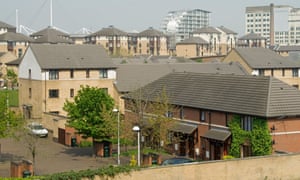Newham council says HMRC may be losing £200m a year in London alone after finding half its 27,000 landlords failed to register for self-assessment
 Newham council estimated it had 30,000 private properties rented out by 5,000 landlords. After the licensing process, it found 50,000 properties owned by 27,000 separate landlords. Photograph: Justin Kase z11z / Alamy/Alamy
Newham council estimated it had 30,000 private properties rented out by 5,000 landlords. After the licensing process, it found 50,000 properties owned by 27,000 separate landlords. Photograph: Justin Kase z11z / Alamy/Alamy
Sunday 13 August 2017 14.04 BSTLast modified on Monday 14 August 2017 01.05 BST
Up to 13,000 landlords in just one London borough have been identified as failing to declare their rental income, prompting estimates that unpaid tax in the capital is costing the public purse nearly £200m.
Newham council in east London, the first to introduce a compulsory borough-wide licensing scheme for landlords in 2013, shared their names and property addresses with HM Revenue & Customs. Newham, which has 27,000 registered landlords, said it understands that 13,000 had not registered for self-assessment, which is generally required if a property owner receives £2,500 a year or more in rent. HMRC would not confirm the figure.
The council estimated that unpaid tax by landlords is costing the public purse nearly £200m in London – and far more nationally.
In a letter sent to the chancellor, Philip Hammond, the mayor of Newham, Sir Robin Wales, said: “It is our understanding that, to date, up to 13,000 Newham landlords are of interest to HMRC, where there are discrepancies between declared income and our records, with potentially significant financial implication for the exchequer.”
Newham is battling with the Department for Communities and Local Government to have its licensing scheme renewed, following a 2015 clampdown by the government, which said licensing imposes “unnecessary additional costs” on landlords. Neighbouring borough Redbridge has already had its application for landlord licensing rejected.
Wales told the chancellor in his letter: “Our core grant funding has halved since 2010-11, that’s less money for our schools, less money for social care, and less money for housing. I urge you to assess the additional benefits of Newham’s licensing scheme in assisting the exchequer to address tax evasion by landlords.”
Newham said it understands that HMRC is currently contacting local landlords who have failed to register their rental revenues. The tax authorities have the power to claw back unpaid tax over 20 years, with penalties of up to 100% of the tax demanded.
In a statement, HMRC said: “We are working with the London Borough of Newham as part of the Let Property Campaign. This work has generated £115m in additional and previously unpaid tax and interest.”
HMRC’s Let Property Campaign was launched in 2014 amid concerns that up to 1m buy-to-let landlords are not declaring their rental income. HMRC said at the time that it believed landlords were avoiding around £550m in tax, although Newham’s experience may suggest that the figure could be much higher.
Newham said it has instigated 1,135 prosecutions for housing crimes – 70% of all such prosecutions in London. It has banned 28 landlords, served 2,170 notices to improve properties, and recovered £2.6m in additional council tax.
Before Newham began mandatory landlord licensing, it had estimated that the borough had 30,000 private properties rented out by around 5,000 landlords. But as a result of the licensing process, it discovered 50,000 rental properties owned by 27,000 separate landlords.
Newham has among the highest levels of private renting in the UK. Between 2006 and 2016, the share of the total housing stock in the borough owned by private landlords leapt from 21% to 46%, with just 23% of homes now owner-occupied.
Liverpool, Waltham Forest, Barking and Dagenham, and Croydon have all introduced compulsory licensing schemes following Newham’s success, but other boroughs hoping to match them have run into opposition from central government.
Since 2015, local authorities have been forced to apply to the secretary of state for permission to license landlords if the scheme affects more than 20% of the homes in the borough or its geographical area.
Housing minister Brandon Lewis wrote to local authorities in March 2015 to warn them of an amendment to licensing rules. He said: “The blanket licensing approach adopted by some local authorities has major drawbacks. This is because it impacts on all landlords and places additional burdens on reputable landlords who are already fully compliant with their obligations, thereby creating additional unnecessary costs for reputable landlords which are generally passed on to tenants through higher rents.
“The vast majority of landlords provide a good service and the government does not believe it is right to impose unnecessary additional costs on them, or their tenants. Such an approach is disproportionate and unfairly penalises good landlords.”
However, Newham said its licensing had won the support of 90% of local residents, and that the the vast majority of landlords have had to pay just £150 for a five-year licence. However its fee for new landlords is planned to rise to £400. Liverpool charges £400 for the first property and £350 for each additional property.
Newham’s scheme comes to an end in December, and because of the restrictions imposed in 2015, it has been forced to apply for permission for another five-year period. The council made a formal application to the government to continue its scheme last month.




No comments:
Post a Comment